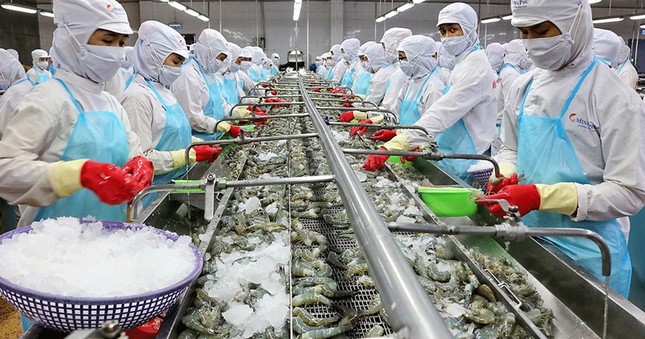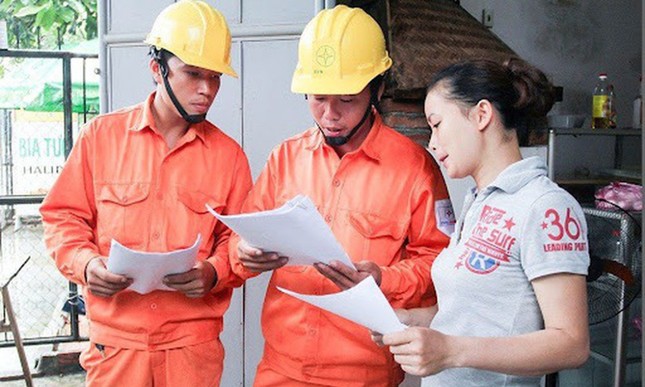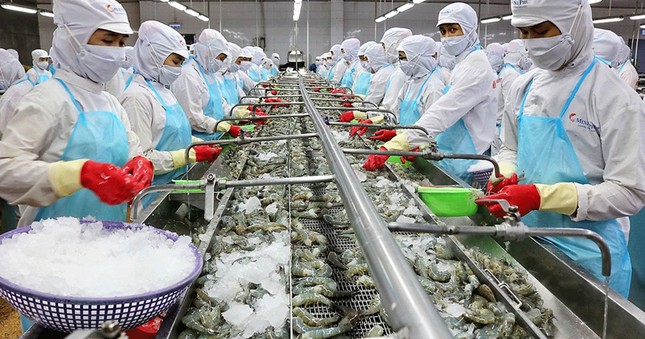Rising Costs: A Challenge for Businesses and Households Alike
As per the Vietnam Electricity Group (EVN), electricity retail prices have surged by 4.8% since May 10, pushing the average price above 2,200 VND/kWh. This is the second adjustment since 2023, resulting in a cumulative increase of over 17% in three years. The surge in electricity prices is causing concerns among businesses and households alike.
Mr. Tran Van Linh, Chairman of the Board of Directors of Thuan Phuoc Seafood and Trading Joint Stock Company, shared with Tien Phong that the seafood processing industry is highly electricity-intensive, especially with the constant need for cold storage. Currently, the company pays an average of 1.5-2 billion VND per month in electricity bills, depending on production volume and actual energy consumption. With the recent price hike, the company expects to incur an additional cost of up to hundreds of millions of VND per month.

The surge in electricity prices will result in increased costs for many exporting businesses.
“In the context of export market pressures and the US tax policy challenges, this price hike is like a blow that makes it difficult for businesses to operate,” said Mr. Linh. The immediate impact is higher production costs, leading to increased product prices and reduced profits for businesses. In the long run, it will affect their competitiveness, especially with the current challenges in the export market,” he added.
Mr. Nguyen Xuan Nhu, director of a mechanical company in Dien Chau, Nghe An, shared that electricity costs account for about 10-15% of the product cost. Businesses in the mechanical industry are highly sensitive to electricity price increases as they directly impact product prices. Moreover, the most concerning aspect is the ripple effect on other input factors such as raw materials, logistics, and operations,” he said.
With thin profit margins of only about 5-10% in the mechanical industry, the price hike could push many businesses into losses if they don’t restructure their operations. Additionally, workers will face increased living costs, forcing companies to consider salary adjustments and other issues,” Mr. Nhu added.
Ms. Nguyen Thu Huong, a resident of Nam Tu Liem, Hanoi, shared that her family of four used to pay around 600,000-700,000 VND for electricity. With the 4.8% increase, it may not seem like much, but combined with rising rent and water prices, it puts a strain on the family’s fixed expenses.
“What’s concerning is that as we enter the hot season, when electricity demand surges, the prices go up as well, leading to a significant increase in our electricity bills. Just in the last two months, our electricity bill has jumped to 1.2-1.3 million VND, forcing us to cut back on other expenses like dining out or shopping,” she said.
The Need for Convincing Price Increases
Mr. Vo Quang Lam, Deputy General Director of EVN, explained that the 4.8% increase is based on regular reviews and complies with the Electricity Law and Decree 72 on electricity price adjustments. Additionally, production and electricity purchase costs have risen, especially with the reduced proportion of cheap electricity sources like hydropower due to weather influences.

Experts emphasize the need for EVN to ensure transparency in input costs alongside price increases.
However, with EVN’s financial situation for 2024 not yet publicly disclosed, the price hike has raised questions about the company’s efficiency and the control of operating costs in its total increased cost structure. The Ministry of Industry and Trade’s audit results show that EVN’s total electricity production cost in 2023 was over 528,600 billion VND, corresponding to a cost of about 2,088.9 VND/kWh. EVN still has tens of thousands of billion VND in accumulated losses from previous years and over 18,000 billion VND in unrealized exchange rate differences.
In an interview with Tien Phong , PGS, TS. Nguyen Minh Due, an expert from the Energy Association, stated that electricity price adjustments are complex and depend on various factors such as generation, transmission, and distribution costs. He emphasized the need for transparency and fairness in the process. Currently, the production costs for different types of electricity and operational stages in Vietnam are unclear, leading to public concerns with each price adjustment by EVN.
“While the price increase is necessary, given that electricity prices in Vietnam are still lower than in other countries, the breakdown of cost increases to justify the new price should be communicated. EVN needs to be transparent about these details to allow for public scrutiny and make the price increase more convincing,” said Mr. Due. He also suggested that the electricity sector should promptly implement the two-part tariff mechanism, which has been a challenge in the past.
Mr. Nguyen Tien Tho, former Director of the Price Management Department, pointed out that the electricity price increase would have both direct and indirect impacts, potentially affecting the CPI by up to 0.34%. Therefore, he emphasized the need for strict management by relevant agencies. “Price increases should be accompanied by a transparent roadmap, deep reforms in the competitive electricity market, and effective financial control mechanisms for EVN. Otherwise, people and businesses will continue to bear the costs without clear commitments from the supplier,” he added.
The Speaker: In Many Places, Only a Change in Party Secretary or Chairman Results in Alterations to Urban Planning
“The Speaker of the House expressed concern over the lack of long-term vision in provincial planning. He noted that the efforts of the current secretary and chairman to develop a comprehensive plan might be undone by the next administration, leading to a constant cycle of changes with little stability.”
The New Regulations on the Development Mechanism for Gas-fired Power Projects
The government has recently issued Decree No. 100/2025/ND-CP dated May 8, 2025, amending and supplementing Decree No. 56/2025/ND-CP dated March 3, 2025. This new decree provides detailed regulations on power development planning, electricity network development schemes, investment in power projects, and bidding for the selection of investors in power business projects.
“Resolution 68: Businesses Breathe a Sigh of Relief as ‘Knock-and-Inspect’ Worries Subside”
The proposal to inspect businesses only once a year, unless there are clear signs of violations, along with other supportive solutions, is expected to unburden and reduce the pressure on enterprises. This move aims to foster a thriving business environment by striking a balance between regulatory compliance and business freedom.
“Proposed Discount Shopping Center in Ho Chi Minh City to Lure Tourists”
“Red tape is a significant hindrance to the growth and prosperity of Vietnam’s business community. This is according to the Chairman of the Business Association in Ho Chi Minh City, who highlights the cumbersome administrative procedures as a key issue facing enterprises today. The current bureaucratic red tape is stifling the dynamic and innovative spirit of businesses, hindering their ability to adapt, grow, and contribute to the country’s economic development.”





















